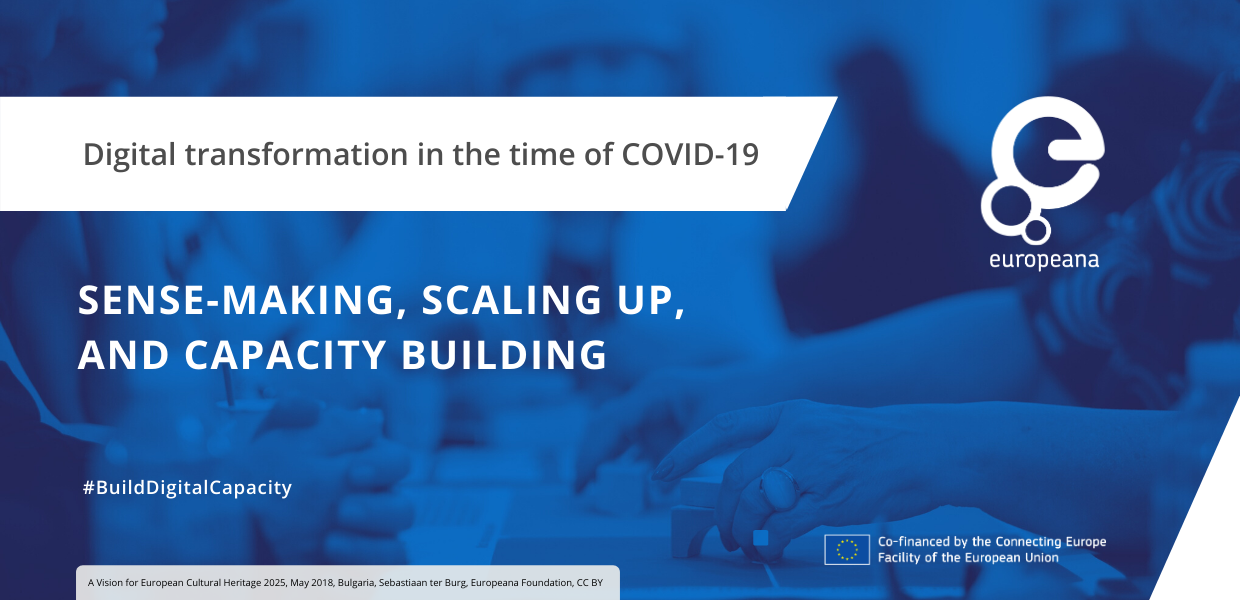Understanding digital transformation across the cultural heritage sector
Last week we invited our networks to take part in a special series of Europeana workshops on ‘Digital Transformation in the time of COVID-19’. In this post, we share other aspects of our ongoing efforts to understand, identify and shape a capacity building framework that meets the needs of the cultural heritage sector. In particular, how we are working with Culture24 to develop a shared understanding of what is happening in our sector to support digital capacity and what terms like ‘digital transformation’ mean in practice for GLAM institutions.

- Title:
- A Vision for European Cultural Heritage 2025
- Creator:
- Sebastiaan Ter Burg
- Date:
- May 2018, Bulgaria
- Institution:
- Europeana Foundation
- Copyright:
- CC BY
Europeana empowers the cultural heritage sector in its digital transformation, and our approach sees digital capacity building to support this transformation as a priority. Yet the needs of cultural heritage institutions are many and varied. What does ‘digital transformation’ look like across our diverse sector? By gaining an understanding of what this term, and terms related to digital change, mean in practice for cultural heritage institutions, we can better understand their needs, and develop support for institutions to build capacity for digital.
Our Digital Transformation workshops will play a key role in this process. As we work and ideate with thought leaders from the sector, we will gain insights into the challenges and needs they face within their institutions, and how we can develop frameworks to support them. But understanding these needs requires a multi-faceted approach, and we are pleased to be able to explore this further through a special report we have commissioned with the organisation Culture24.
The report will consider what ‘digital transformation’ and ‘capacity building’ means in practice for GLAM institutions; provide a picture of what ‘state of the art’ looks like for programmes that support digital capacity building in the GLAM sector; and present best practice and insights into this issue from leading experts, practitioners and projects across the GLAM sector internationally.
It will also explore how terminology related to digital change - including digital transformation, digital literacy, digital skills, digital capabilities and digital leadership - is used across the GLAM sector internationally. Insight into how these terms are understood, and even misunderstood, across the sector will help us to demystify their significance and build a shared understanding of their meaning to the sector. This will help identify gaps where knowledge and skills are missing and build capacity in areas of greatest need.
This work will build on the recent One to One multi-partner project, which brings together academic researchers with museums, sector support organisations and policy makers across the UK. The project has helped museums define, improve, measure and embed the digital literacy of their staff and volunteers, and encourages staff at all levels to consider their own digital skills through exploring how they use, understand, manage and create digital. This helps institutions to understand what is needed to create a digitally fluent workforce.
The report will also present insights into this terminology through a series of structured interviews with leading experts, practitioners and projects across the international GLAM sector. This will map hot spots of activity by people leading best practice within and beyond the GLAM sector, and contribute towards high-level recommendations of its development.
This research and report, alongside our digital transformation workshops, form the first stage of our phased project to help us understand, identify and shape a capacity building framework that meets the needs of the sector. We will continue to work to gain insight from the experience and expertise of professionals from across the continent, and look forward to sharing our learning widely for the benefit of the sector.

